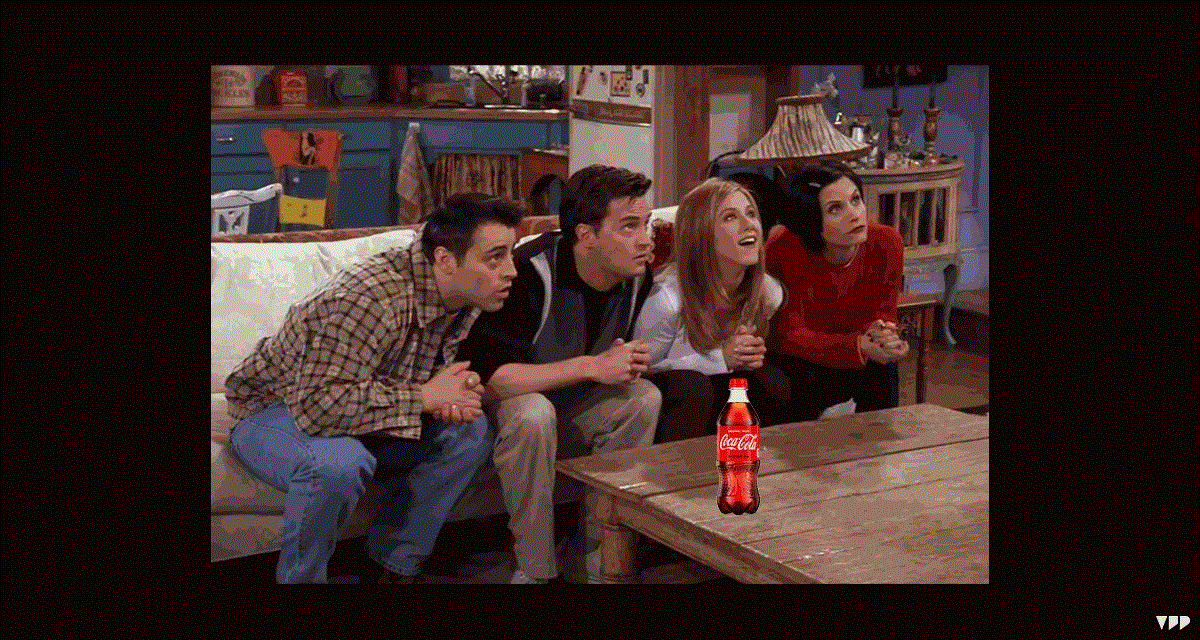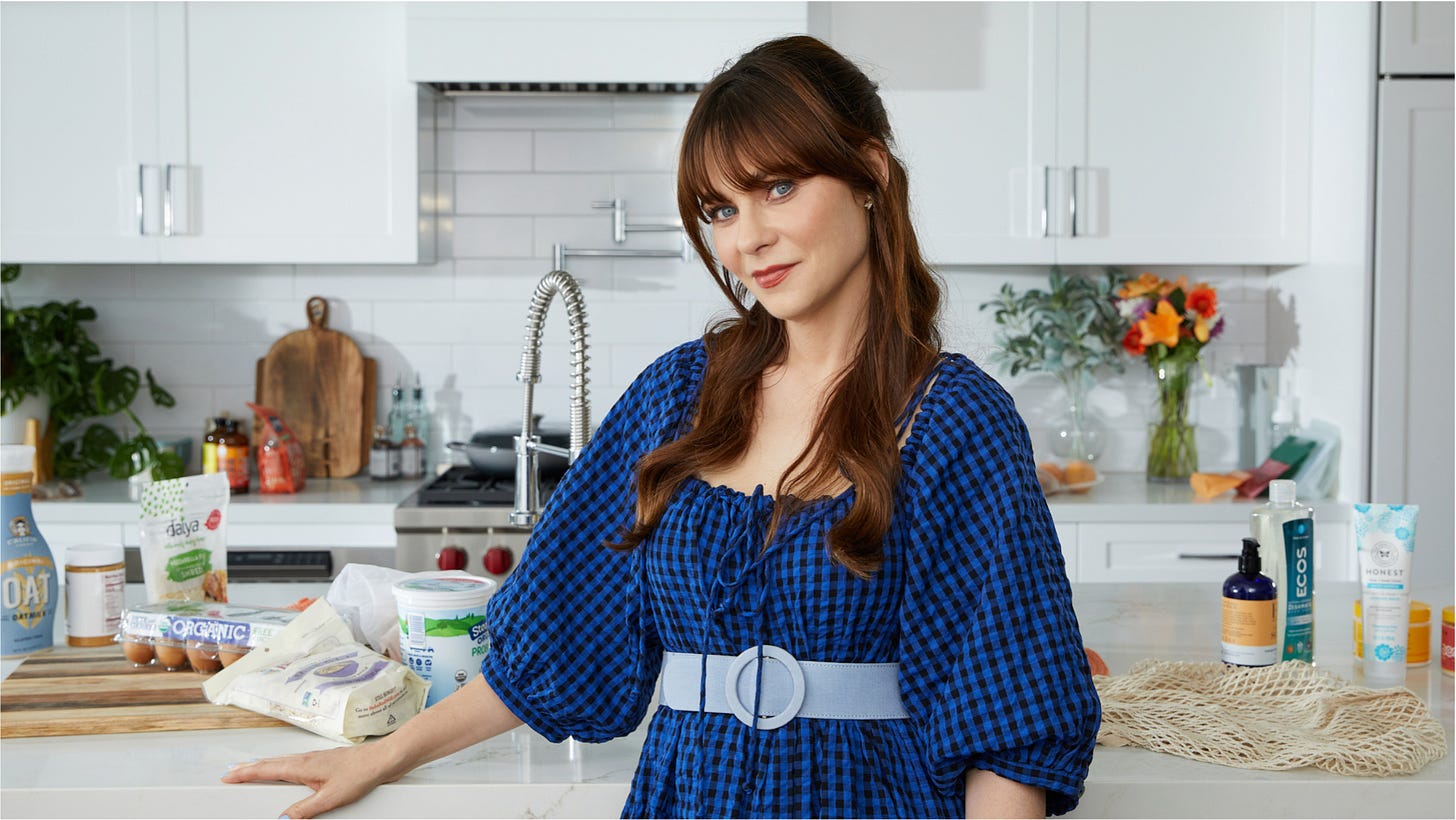Iterate Weekly - Issue 70
This week we're looking at virtual product placements, the "slow productivity" movement, Zooey Deschanel and Merryfield, smart scarves for soccer fans, and "Amusing Ourselves to Death"!
Welcome to issue 70 of Iterate Weekly!
Just a reminder that you can always reply to this email or leave a comment on the web version. I read all of them, and I appreciate the feedback, questions, and insights from all of you.
Let’s jump into this week’s stories.
🤖 Tech
Virtual Product Placements
We’ve all become somewhat accustomed to seeing product placement in media right? There is that perfectly angled Starbucks coffee cup in an actor’s hand, or a Nike Swoosh proudly displayed on their chest in the training montage scene.
But how do you feel about advertiser’s retro-actively adding product placements to existing media?
It’s an issue that modern streaming platforms are currently dealing with. Is it smart business or morally questionable to add a CGI product to a scene that was originally shot decades ago?
The example above may be a bit extreme (a cartoonish looking Coke bottle magically popping into a scene from Friends) but it could be the future of advertising spends on streaming services.
We’ve learned that catalogs of classic television series are extrememly lucrative in the streaming wars. Yes, there are tiered subscriber packages that allow you to pay extra to remove those pesky commercials that interrupt your viewing experience, but what if advertisers start dynamically serving product placements based on your spending habits.
Just think of the possibilities. On an episode of Friends, Joey may be chugging a Gatorade if your spending habits show you’re active. But in that same episode he may be enjoying a Heineken instead if the algorithm detects you’re over 21 and enjoy an occassional alcoholic beverage.
Amazon and NBC have already started testing this ability on content streamed on Prime Video and Peacock respectively. Maybe you’ve even seen some “fake” product placements yourself recently. Did you notice? Do you even care? It’s a tough question to answer.
Advertisers are always going to be in search of new ways to get their products in front of potential customers. In a way, you have to applaud the inginuity here, but it also just feels wrong to tinker with the taste preferences of iconic television characters.
Streaming platforms don’t currently have to adhere to the same strict advertising restrictions found during live TV broadcasts. Until that changes, don’t be surprised if you start seeing some very questionable product placements on your favorite iconic shows.
🎓 Education/Productivity
Embracing “Slow Productivity”
Here’s a great article in the New Yorker from one of my favorite productivity expert’s Cal Newport. It’s all about embracing the concept of “slow productivity.”
I love this phrase. Don’t get me wrong, I’m a big believer in having daily objectives and trying to maximize the productive hours in a day. I’m also well aware that our society is moving at a pace that isn’t sustainable. No matter what type of work you do, burning out is a legitamate concern. The human brain is only capable of making so much progress in a 24-hour period.
Newport discusses the growing momentum behind the four-day workweek as a means to keep workers fresh and productive over the long haul. He even cites a specific study out of Iceland that proved that employees were able to get as much done in four days while benefitting from the increased time spent on hobbies or domestic chores.
It’s all part of a larger movement of “slow things”. We’ve heard the term “slow food” used a lot when trying to encourage consumers to think about where their food comes from and how they should consume it. “Slow work” seems like the next natural progression of this concept. We should be working with more intention, devotion, and appreciation. Think of it like savoring one heirloom tomato from a farmer’s market instead of scarfing down a whole box of McDonald’s french fries while driving.
What are some ways you can embrace slowness in your work?
♻️ Health & Environment
Merryfield pays us for choosing sustainable brands
Have you heard of Merryfield? Up until a few weeks ago, I hadn’t either.
It’s an app that rewards you for purchasing products from companies deemed “better-for-you”. That could mean they are healthier than alternatives, have a smaller carbon footprint, or just have more transparency in their labor practices or ingredient list.
And yes, that is a photo of Zooey Deschanel above. She’s teamed up with Merryfield co-founder David Mayer as a creative voice/brand ambassador/vague leadership role within the company. It’s actual part of a rather fascinating career trajectory for Deschanel that I learned about in this fantastic Entrepreneur article from a few months back. She is establishing herself as a leader in the sustainable branding world.
Merryfield is super easy to use. You just create an account and then scan any physical paper receipts from trips to the grocery store. If your reciept shows that you purchased something from a brand on their list, you earn points. These points can be redeemed for gift cards from a slew of brands including Amazon, REI, or Airbnb among others.
They even let you connect your digital accounts to Merryfield so you’ll get credit for online orders from places like Amazon, Whole Foods, Target, Sprouts, Safeway, and more. They even choose specific products each week that will net you bonus points if you purchase them. You can really go crazy and optimize your shopping or just setup your accounts once and buy groceries as usual.
It’s an interesting concept and I saw tons of brands on their list that I’m already actively purchasing on a daily basis. Any effort to support brands that are doing good is ok in my book. And if we get a few free gift cards in the process, even better!
Anyone else using Merryfield? Sign up here if you’re interested!
🛍 Grab Bag
Smart scarves for soccer fans
I’m a sucker for any new example of wearable tech. A smart scarf for soccer fans is right up my alley!
The product is a collaboration between Manchester City and Cisco as a way to gauge fan interest during a match.
Each scarf features an Emotibit sensor that sits on the fans neck. The senor will detect changes in skin sweat to determine emotions felt by fans during the game. It’s similar to some of the technology found in other wearable fitness trackers. Most notably the electrodermal activity (EDA) sensor is a component found in the Fitbit Sense.
What exactly are they looking to gain from this data? It’s pretty safe to say that wins, losses, and draws will correlate to positive, negative, and neutral biometric data. But there could be some new learnings found here I suppose. The marketing speak from the club is pretty priceless.
The club’s official line says it’s meant to “shape more curated, customized experiences in the future” and “serve as a study in shared passion.”
Only select fans have been chosen to test out the scarf right now. It is not available for public purchase just yet. American fans should not feel left out as the team has said there will be a similar version shared with sister club New York City FC.
There are certainly some privacy concerns here with all the data they will be collecting. It’s also hard to see a quantifiable benefit for the fan. Any data here will likely just be used to sell products at well-timed “micro-moments” during a match. Not to mention the questions about washing a piece of clothing that has a biosensor in it.
Would you be open to wearing a sensor to give feedback while attending sporting events?
💬 Quote of the Week
“The shock of twentieth-century technology numbed our brains and we are just beginning to notice the spiritual and social debris that our technology has strewn about us.”
- Neil Postman
📕Content Recommendation
Amusing Ourselves to Death
This week I finished reading “Amusing Ourselves to Death” by Neil Postman.
The image above comes from the special 20th anniversary edition that came out in 2005, but I recently read the original version from 1984 and it hold up beautifully (albeit with some outdated references).
It’s a non-fiction look at how modern media has changed human life. At the time of the initial writing, this media was primarily television. He looks at how TV has shaped politics (just substitute Donald Trump for his Ronald Reagan anecdotes), religion, news, and education.
Postman was clearly ahead of his time in recognizing some trends (both positive and negative) when it comes to our attention spans and the way we consume information.
If you’re at all interested in media studies or the history of television, you will thoroughly enjoy this book.
Thanks for reading, I’ll see you next week!
P.S. - Are you looking for a coach? I’m looking to work with some potential new clients and would love to help you out. Click here for more info!







Thanks for talking about retroactive product placements. I learned something new today!